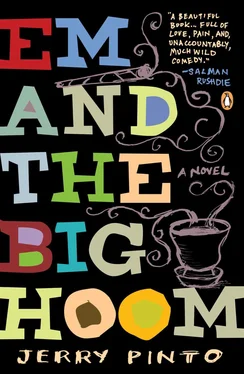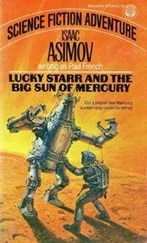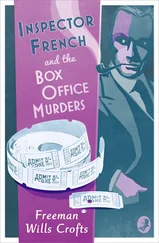Jerry Pinto - Em and the Big Hoom
Здесь есть возможность читать онлайн «Jerry Pinto - Em and the Big Hoom» весь текст электронной книги совершенно бесплатно (целиком полную версию без сокращений). В некоторых случаях можно слушать аудио, скачать через торрент в формате fb2 и присутствует краткое содержание. Год выпуска: 2014, Издательство: Penguin Books, Жанр: Современная проза, на английском языке. Описание произведения, (предисловие) а так же отзывы посетителей доступны на портале библиотеки ЛибКат.
- Название:Em and the Big Hoom
- Автор:
- Издательство:Penguin Books
- Жанр:
- Год:2014
- ISBN:нет данных
- Рейтинг книги:3 / 5. Голосов: 1
-
Избранное:Добавить в избранное
- Отзывы:
-
Ваша оценка:
- 60
- 1
- 2
- 3
- 4
- 5
Em and the Big Hoom: краткое содержание, описание и аннотация
Предлагаем к чтению аннотацию, описание, краткое содержание или предисловие (зависит от того, что написал сам автор книги «Em and the Big Hoom»). Если вы не нашли необходимую информацию о книге — напишите в комментариях, мы постараемся отыскать её.
Em and the Big Hoom — читать онлайн бесплатно полную книгу (весь текст) целиком
Ниже представлен текст книги, разбитый по страницам. Система сохранения места последней прочитанной страницы, позволяет с удобством читать онлайн бесплатно книгу «Em and the Big Hoom», без необходимости каждый раз заново искать на чём Вы остановились. Поставьте закладку, и сможете в любой момент перейти на страницу, на которой закончили чтение.
Интервал:
Закладка:
‘I mean, that “he’s the one” stuff?’
‘What do I know about men? I’ve only…’
‘Yes, yes, you’ve only had one.’
‘Got you there, you foul-mouthed blob of scum. I was going to say I’d only known one well.’
‘In the Biblical sense, no doubt.’
‘Got me back. Where was I when I so rudely interrupted myself?’
‘He took your hand. You thought it was a subtle gesture, coded with many meanings. I wondered about that. You were explaining.’
‘That must be a skill you could use.’
‘I think it’s called being a rapporteur.’
‘Does it pay?’
‘I suppose. I don’t know.’
‘Not much use then.’
Not much use. The trail was lost and the story had ended. For a while.
4. ‘The prayers of mentals’
If there was one thing I feared as I was growing up…
No, that’s stupid. I feared hundreds of things: the dark, the death of my father, the possibility that I might rejoice at the death of my mother, sums involving vernier calipers, groups of schoolboys with nothing much to do, death by drowning.
But of all these, I feared most the possibility that I might go mad too. If that happened, my only asset would be taken from me. Growing up, I knew I did not have many advantages. I had no social skills. I had no friends. I had no home — no home that was a refuge. I seemed to have no control over my body; my clumsiness was legendary. All I had was my mind and that was at peril from my genes.
Em’s manic state was often ugly but it is how I remember her: as a rough, rude, roistering woman. In this state, she came at us as an equal. But it was the other Em who was my night terror. As if it were a wild animal with flecks of foam at its mouth, I feared her depression.
I found it hard to reconcile the way that word felt to the state my mother was in when she was dragged down into the subterranean depths of her mind. Depression seemed to suggest a state that could be dealt with by ordinary means, by a comedy on the television or an extravagance at a nice shop. It suggested a dip in level ground where you might stumble, but from which you might scramble, a little embarrassed that it should have caught you unawares — a little red-faced from the exertion — but otherwise unharmed.
Em’s depressions were not like that.
Imagine you are walking in a pleasant meadow with someone you love, your mother. It’s warm, and there’s just enough of a breeze to cool you. You can smell earth and cut grass, and something of a herb garden. Lunch is a happy memory in your stomach and dinner awaits you — a three-course meal you have devised — all your comfort foods. The light is golden with a touch of blue, as if the sky were leaking.
Suddenly, your mother steps into a patch of quicksand. The world continues to be idyllic and inviting for you but your mother is being sucked into the centre of the earth. She makes it worse by smiling bravely, by telling you to go on, to leave her there, the man with the broken leg on the Arctic expedition who says, ‘Come back for me; it’s my best chance,’ because the lie allows everyone to believe that they are not abandoning him to die.
Some part of you walks on and some part of you is frozen there, watching the spectacle. You want to stay but you must go. The imperium of the world’s timetable will allow you to break step and fall out for a while, but it will abandon you, too, if you linger too long by your mother, now a curled-up foetal ball, moaning in pain, breathing only because her body forces her to.
The only way to deal with such pain is to blot it out. My mother is now in a state where her mind tortures her. It will not even let her sag into apathy. Sometimes I see her body twitching a little in pain. Sometimes I see her forcing herself into a rigid stillness. Nothing will help her answer whatever savage questions her mind is asking.
This is darkness and all that we have as remedy are pills. They don’t work. Not when she is this way. My mother lives through the long black night of the mind. She longs for death. She asks us if we can give it to her.
‘Kill me,’ she says on days when the pain is so bad that she is panting with it, small barely audible sobs. ‘Let me die.’
I don’t know what to do or how to respond. I want to kill her. I even know how I will do it. First some very strong drugs, of which there is a readily available supply. Then, when she is sleeping, her breath stertorous, a pillow. I run it as a thought experiment, just as I might run the ‘What will I do when my father dies’ experiment. I don’t think I will be able to hold her down if she flails, so I’m hoping that the drugs will make her quiescent.
But I also know that I will not do this. (I wonder if she knows this too and that is the reason why she asks.) I will not do this because I know that she is coming up now. This is the worst of it and it can only be a couple of days more before she begins to surface. These will be days when The Big Hoom will sit by her bed and she will hold his forearm as he reads the paper. From time to time, she will say, ‘Mambo?’
And he will put down the paper and look at her.
‘Nothing,’ she will say.
And he will begin to read again.
For two or three days, we will all live with the knowledge that one of us is gulping for air, swallowing sobs, experiencing pain that will not let up. We will rearrange our lives so that someone is always with her. One morning when I am alone with her, I give her five small orange Depsonils, when her prescription says one.
Does it help? I think not.
The only thing that helps is nicotine, but often on these sludge days of small jerks, aching gasps and no tears, too deep now for tears, she cannot even bring herself to smoke more than a few puffs. She pulls hard and then lets go, gives up, throws away the burning beedi and rushes back to bed and curls up again.
I don’t know how to deal with this.
Once, in a desperate — why do these words come when I’m talking about me? I have no despair, have had no despair so immense as this — so: once, in a timid attempt to help, I took her hand in mine and sat with her. My motives were mixed. I wanted to help but I had also written the stage directions for myself: ‘Enter son, stage left. He looks at her for a moment and then goes and sits by her side. He takes her hand in his and offers her what consolation he can.’
For a while her hand lay limp in mine and she stopped twitching and she stopped gasping and she looked at me and she rearranged her face into a smile.
But this was her, my sensitive and civilized mother, allowing herself to be part of my script. And so we did not sit like that for long because she was acknowledging the gesture of being comforted by pretending to be comforted. The effort was too great, and finally she took her hand away and said, ‘Go baba, go do your work,’ and then exhaled her relief.
As I exhaled mine.
I don’t know how to describe her depression except to say that it seemed like it was engrossing her. No, even that sounds like she had some choice in the matter. It was another reality from which she had no escape. It took up every inch of her. She had no time for love or hate, fatigue or hunger. She slept ravenously but it was drugged sleep, probably dreamless sleep, sleep that gives back nothing.
She went up. She came down. She went up again. We snatched at her during the intervals. There was no way to say when she would be up or when she would be down. Susan had tried to plot her moods against the cycles of the moon and had come up with no conclusive data even after five years. Then she tried to plot them against Em’s menstrual cycles but that had revealed nothing either. The only thing we knew was that September was a bad month; she would be manic through the whole of September, manic in a way that made me wonder how I could ever feel pain for her when she was low.
Читать дальшеИнтервал:
Закладка:
Похожие книги на «Em and the Big Hoom»
Представляем Вашему вниманию похожие книги на «Em and the Big Hoom» списком для выбора. Мы отобрали схожую по названию и смыслу литературу в надежде предоставить читателям больше вариантов отыскать новые, интересные, ещё непрочитанные произведения.
Обсуждение, отзывы о книге «Em and the Big Hoom» и просто собственные мнения читателей. Оставьте ваши комментарии, напишите, что Вы думаете о произведении, его смысле или главных героях. Укажите что конкретно понравилось, а что нет, и почему Вы так считаете.











